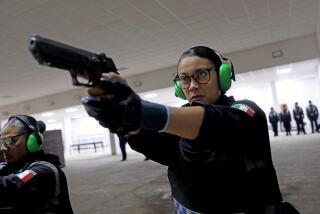Column: A Beautiful Sight: the System Working the Way It Should
- Share via
In matters of human rights there is nothing more beautiful than to see the System work.
The fast charges brought against seven policemen in the killing of two unarmed Mexicans gave the Chicano community a much needed breathing spell. Some of its leaders were beginning to despair that East Los Angeles would “blow up” unless there was clear indication that working within the system is not just a synonym for selling out.
Another indication that the System is working was a decision by the California appellate court which prompted the district attorney to drop charges against Sal Castro and 12 others involved in the 1968 East Los Angeles high school walkouts.
The court ruled that the conspiracy charges against these Chicanos “rests entirely on circumstantial evidence” and that this type of “conspiracy-circumstantial evidence” route is “too blunt an instrument.” These two important decisions came just as too many Chicanos were beginning to agree with the dictum of Brown Beret leader David Sanchez which goes “To the Anglo ‘justice’ means ‘just us.’”
The killing of the two Mexicans on July 16, Rep. Edward Roybal said during the crisis, was caused by the “utter lack of professionalism displayed by the policemen ... More was lost that evening than the lives of these two men.
“The Mexican-American community’s faith in and respect for their law enforcement agencies was totally shattered that night.”
Asserting that “no longer is it advisable to leave this grave crisis in the hands of the local authorities,” Roybal asked for and got a federal grand jury investigation.
On hearing this, a television newsman and Roybal’s opponent in the November election asked one of the most irrelevant questions ever aired.
Why, they asked, didn’t Roybal call for a federal grand jury investigation when two Mexicans killed two Border Patrolman a couple of years ago?
Though the question is irrelevant, the answer is pertinent to what Roybal calls the “swiftly approaching midnight hour for police community relations.”
When the Border Patrolmen were killed it was crystal clear what had to be done. The murderers had to be found and punished.
When a policeman kills a civilian things aren’t that clear. When there is a question about the officer’s comportment in such a death, the case is sometimes turned over to the county grand jury where it is handled in secrecy.
Councilman Billy Mills, in reference to a constituent killed by police, thinks this is highly unsatisfactory and that a way must be found to make investigations of police shooting public.
Roybal, who like Mills is attuned to how the minority communities feel about the issue, said after the shootings of the two Mexicans:
“Either the governmental authorities responsible for supervising the activities of our law enforcement agencies fulfill their responsibility to stop this abuse of police power or they must be prepared to confront the real possibility of a general breakdown in law enforcement withing the racial and ethnic communities of Los Angeles.”
What all this really means is that both the community and the police are understandably afraid about the growing violence in our society. Let’s not for a minute forget that two policemen were recently killed in Chicago while working with community groups and let’s not forget the four California Highway Patrolmen slaughtered in Newhall.
What we must forget is old attitudes which are now very dangerous to hold.
Anyone who has worked a police beat as a reporter, as I have, knows that policemen tend to have difference attitudes toward enforcing the law depending on the social, financial and racial makeup of the people they deal with.
This is not a special police attribute but it becomes very important when an armed policeman has some sort of confrontation with an unarmed civilian.
Another attitude that policemen must learn to forget is their uptight defensiveness when questioned about touchy matters. (Newsmen, by the way, suffer from this too.)
Some time ago I asked a high police official to confirm or deny information which I had which showed that a policeman who had just shot a Mexican-American boy had been suspended twice before, once for threatening another boy with a cocked pistol.
“Before I answer that,” the police official said, “let me remind you that the release of such information will hurt your community more than it will hurt mine.”
The implications of that statement are staggering and too complicated to go into here. But one of the implications was that certain communities, in this instance Mexican-Americans, can not handle certain kinds of information.
After the recent shootings of the Mexican nationals I was confronted with sort of attitude again. As news director of KMEX-TV (a Spanish-language station) I authorized the showing on our newscast of two very good interviews with the survivors of the shootings shortly after they happened.
The morning after the newscast two policemen visited me to express their concern about the showing of the interviews. They did not question my right to run the interviews but warned me about the “impact” the interviews would have on the police department’s image. Besides, they said, this kind of information could be dangerous in the minds of barrio people.
Communications nowadays, whether through the underground press or national networks, are too good to take refuse in this sort of attitude. What we must do is level with each other more, not less.
The district attorney’s quick and decisive action in the killing of the two Mexican nationals was a beautiful way of showing that the System does work. Let’s keep it that way.
More to Read
Sign up for Essential California
The most important California stories and recommendations in your inbox every morning.
You may occasionally receive promotional content from the Los Angeles Times.











